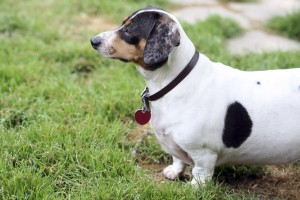 Bowls of gravy, golden turkey legs, and buttered rolls from the oven – all these rich foods signal the arrival of Thanksgiving and other winter holidays. Unfortunately, the amount of feasting that occurs during this time of year also results in an increased number of cases of pancreatitis in pets.
Bowls of gravy, golden turkey legs, and buttered rolls from the oven – all these rich foods signal the arrival of Thanksgiving and other winter holidays. Unfortunately, the amount of feasting that occurs during this time of year also results in an increased number of cases of pancreatitis in pets.
Pet owners aren’t the only ones who suffer a little GI discomfort after overindulging. Think those leftovers aren’t so bad for Fido? Think again. Table scraps can create more problems than simply a bellyache when it comes to our pets.
What is Pancreatitis?
Pancreatitis is the inflammation of the pancreas, followed by the release and leakage of digestive enzymes. In turn, this leads to the breaking down of tissues.
Along with being a very painful condition, pancreatitis can also become life threatening. Left untreated, a pet suffering from pancreatitis can develop serious heart arrhythmias, breathing difficulties, and an increased risk of hemorrhage.
Although pancreatitis is often associated with the development of other conditions (such as obesity or diabetes), many acute cases are linked to the consumption of rich, fatty foods such as those we eat during Thanksgiving.
Diagnosis and Treatment
In most cases, owners notice their pets vomiting or avoiding food, which prompts them to schedule an appointment with their veterinarian. However, some pets display gastrointestinal symptoms of inflammation while others do not – particularly felines.
When symptoms do occur, they are typically a combination of the following:
- Vomiting
- Lack of appetite
- Abdominal pain and/or distention
- Diarrhea
- Lethargy
- Difficulty breathing
Effectively diagnosing pancreatitis involves a physical exam, urinalysis, and complete blood count and chemistry panel. Since many of the symptoms of pancreatitis can also be attributed to other health conditions, it’s critical to follow up with your veterinarian as soon as you suspect something is wrong.
Pets with pancreatitis often suffer from dehydration, so the first step in treatment is to start administering electrolytes and supplemental fluids, along with controlling any discomfort and pain. Those with more severe or repeat pancreatitis may require continuous IV pain management and antibiotics.
Preventing Pancreatitis in Pets
Despite the seriousness of the illness, keeping your pet at a healthy weight and restricting fatty, fried, or rich foods can prevent pancreatitis. In most cases, it’s best to avoid feeding your pet any human foods.
To help prevent a veterinary emergency over the holidays, practice some of the following pet safety tips:
- If you’re hosting a large gathering, boarding your pet may be the best option to avoid table scraps or the accidental ingestion of toxic or fatty foods.
- If boarding isn’t an option, you should remind your guests that all foods and beverages are “no-no’s” for your pet.
- During food prep or mealtimes, allow your pet to relax in a bedroom or other area of the home (with his or her toys and pet-healthy treats).
Although Thanksgiving is a delicious feast, it doesn’t mean your pet needs to be at risk. Instead of food, look for other rewards that benefit your pet’s health, such as a walk or some indoor/outdoor playtime.
Remember, your love, time, and attention is what makes your pet truly grateful.

